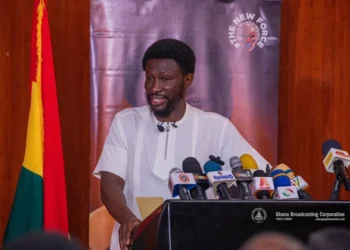A historic $57.44 million project meant to expand the Kotoka International Airport (KIA) to accommodate aircraft of varying sizes, including the biggest commercial airplane in the world, has been suspended indefinitely.
Advertisement
This follows the delay in the release of funds by the Ghana Airports Company Limited (GACL) to complete the project on schedule.
The target was to complete construction works to create space for more aircraft before the end of the first quarter of 2021.
However, due to delays in honouring payment, the contractor working on the project, Messrs Amandi Holding Limited, has halted operations on the site after completing about 31 per cent of the works.
It is being constructed with funding from the internally generated funds (IGF) of the GACL raised from the usage of the airport by airlines and passengers.
Advertisement
GACL response
The Managing Director (MD) of the GACL, Yvonne Nana Afriyie Opare, who responded to the Daily Graphic’s queries dated February 7, 2024, pursuant to the Right to Information (RTI) Act 2019 (Act 989), stated that after 31 per cent of the construction works was completed, the project had been suspended due to delayed payment.
She said the project would resume subject to availability of funds.
“The original completion date was August 21, 2022. Revised completion date to be determined subject to availability of funds,” the RTI response stated.
Blame COVID-19
An international aviation expert, Sean Mendis, said it was not surprising that the project was suspended because the COVID-19 pandemic had wiped away the already stressed IGF of the Airports Company.
Even before the project started, he said the GACL was using its IGF to service the $250 million loan secured for the construction of the KIA Terminal Three project.
“The revenue collected by the GACL from air travel and other usage of the airports was blocked in 2020 following the suspension of commercial flights for six months as part of restrictions on movement to contain the spread of COVID-19.
Advertisement
“The apron project is fortunately not an immediate priority from a safety or critical infrastructure perspective at this time.
“We have seen that 2023 numbers are back to pre-pandemic level for international traffic, so hopefully the 2024 revenues of the GACL will increase significantly in order to refocus on the project,” Mr Mendis added.
GACL faulted
However, a banking consultant, Dr Richmond Atuahene, disagreed and stated that the project delayed because the client (GACL) did not address cost or budget overrun before work started on site.
That, he said, had resulted in the delay or failure of the project and not necessarily COVID-19 affecting IGF.
He explained that in project financing, one of the important risks that needed to be resolved was cost overrun for the project to continue in times of difficulties.
“In case the project is being developed with a loan and halfway into it there is a huge risk and it cannot continue anymore because the loan has been depleted, how will the loan be paid back?
“And so, it is always essential that every project owner, client or manager must have a clear knowledge of how to prevent, identify and manage project cost overruns, otherwise they can cause project delivery delays and even project failure as we have seen in the northern apron situation,” he said.
He said that the key questions which arose at this moment were who did the project analysis, and why was it that cost overrun risk was not considered before work began?
Dicey situation
Dr Atuahene noted that the ideal solution was to find a strategic investor to see the project through successful completion and pay back.
“Unfortunately, who in this world will loan money to Ghana and its agencies, given our difficult economic condition.
Therefore, another option available is for the government to intervene and raise revenue locally to complete the project.
“It has become a dicey situation which requires a strategic solution because the project cannot be suspended forever,” he added.
Graphic visit
When the Daily Graphic team visited the KIA, it noticed that many aspects of the project were still not executed, five years after the sod was cut for work to begin.
Any first timer on site may conclude that the land was abandoned for several years because the project site was bare with portions covered with gravels, weeds and a drain-like trench constructed to knee level almost across the median.
The project site is situated at the airside of the airport and on the right side of Terminal One, which now houses McDan Aviation, a private jet charterer and fixed base operator (FBO).
It is well fenced with temporary offices of the contractor built at the left side of the main entrance.
Although workers were absent, a security officer ushered in the Daily Graphic team and an official of Messrs Amandi Holding Limited provided a guided tour of the project site.
Context
The sod was cut for the construction works on the 10 parking or apron stands at the KIA to start in March 2019.
The project entails apron stands (six code ‘C’ stands and four code ‘E’ stands), link taxiway, apron tax lane and all associated drainage systems.
It also includes extension of the parallel taxiway (400 metres); supply and installation of aeronautical ground lighting (AGL) for apron, taxi lane and tax-link; construction of service road and perimeter wall; extension of fuel hydrant to the new apron, signage and pavement markings.
The objective of the expansion is to increase KIA’s capacity to accommodate more aircraft of varying sizes, including wide body aircraft such as Boeing 747,777 and Airbus A330.
KIA currently has four aprons, namely Bravo, Charlie, Delta and Echo aprons, with 20 parking stands.
The project is part of the government’s vision to expand the frontiers of the aviation industry and make Ghana the aviation hub within the West African sub-region.










Discussion about this post